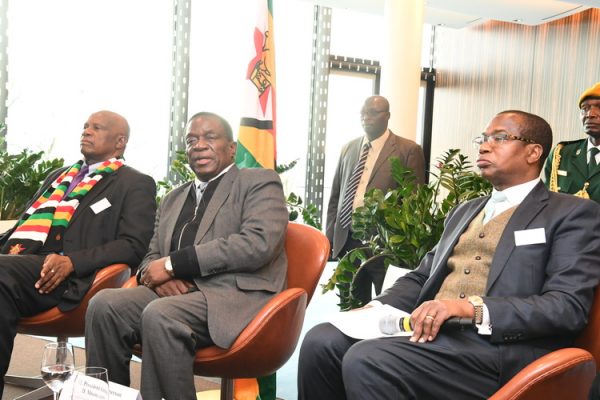I WATCHED the Cabinet announcement with a colleague from East Africa, who opined that Zimbabweans are too easy to please and that they move on faster than expected.
From the dusty campaign trail, the dirty electoral process to the court petition and its disputed outcomes, one would imagine that Zimbabwe would by now be in pieces.
But here we are marvelling at the inclusion of Kirsty Coventry into the Cabinet by a President whose electoral victory has been questioned.
People have hailed Coventry's appointment as marking a new beginning.
For my East African friend, given these political undulations experienced by our nation pre-and post-elections, it is unimaginable how it is already business as usual in Zimbabwe with people now focusing on what the new Cabinet will deliver in the next five years.
His opinion drew from the comments filtering through the different social media platforms which largely focused on the new Cabinet announcement.
Most of the comments expressed excitement and hope as new names were included in the Cabinet.
I responded that the inability of a nation to move on from its points of differences is the precursor to the political polarisation that has threatened to tear our country and several other African countries apart.
While the battle for fairness and justice needs to be pursued to the final end and until these critical values are achieved, contesting and protesting every glitch in the system does not help a nation move forward.
That is one of the reasons our country stalled in the last two decades. The opposition voices were engaged in a war with those who were supposed to govern.
Instead of governing, they focused on defending and protecting themselves, part of which included enriching themselves.
However, the inclusion of new names by the President was indeed an expression of political balance, spine and vision and it caught many by surprise.
It was not easy to drop the names that had dominated our politics and government for so many decades.
But it was also pleasing to see that President Emmerson Mnangagwa paid attention to the calls for clean and visionary hands to lead the country out of the mess created by two decades of Zanu-PF political madness.
While the new faces cast hope, there remains some faces that can potentially cast fears both domestically and internationally.
Perhaps, it was a tight political balance between what needs to be done to revive the economy by bringing in technocrats, but also to reassure the levers of power in the ruling party that they still hold political power.
The latter category is represented by names such as Oppah Muchinguri, Sibusiso Moyo, Perrance Shiri, Cain Mathema, Monica Mutsvangwa and the likes who represent the face of the November 2017 coup, liberation struggle and the military.
Nearly, half of the Cabinet, including the Presidium have some form of military background and they still follow their line of command which makes certain individuals more powerful over how things are done.
With all said and done, the crucial question is what do we make of the new Cabinet?
From my own assessment, there is combination of a strong inclination towards public relations, mainly targeting the international community and investors, and this exercise is articulating a vision to reach out in order to build the economy.
This is in line with the Zimbabwe is open for business policy.
The pivot of this vision lies in the appointment of banker Mthuli Ncube as Finance minister.
Ncube possesses the intellectual prowess and reputation required to boost the waning investor confidence in the previous governments.
His appointment is an expression of seriousness to the international community by the new President that he will unwaveringly give priority to the economy, which is why he has brought in one of the country's best brains.
Ncube will work closely with Winston Chitando, who is in charge of the Mines ministry.
Given that agriculture growth remains stunted due to its historical politicisation of land, lack of investor interest and climatic shocks, mining is going to drive the recapitalisation of the economy in the short-term.
On paper, this looks like one of the best combinations required to resuscitate the ailing economy, but there is need for caution given the President's utterances at the Cabinet announcement that he would do what his party, has requested him to do.
That will be the major deciding factors on how the new Cabinet will perform.
We have had the best combinations before in Nkosana Moyo, Simba Makoni and Joseph Made, but that too did not succeed because policies were determined and decided by the party and not by the technocrats.
That being the case, the key to the success of Ncube and Chitando's policies lies in the ability of the President to allow them to express themselves freely and allocate them the powers and authority required to execute their duties, especially in the presence of political bullies who think Zimbabwe chinhu chavo.
-----
Tapiwa Gomo is a development consultant based in Pretoria, South Africa
- newsday
 OK Zimbabwe posts US$17,8 million loss
OK Zimbabwe posts US$17,8 million loss  Hichilema meets Chivayo
Hichilema meets Chivayo  Millions celebrate Diwali festival in India
Millions celebrate Diwali festival in India  Econet Zimbabwe to delist from ZSE
Econet Zimbabwe to delist from ZSE  Gold edges up as traders await guidance
Gold edges up as traders await guidance  Mnangagwa fires Chitando, appoints Polite Kambamura
Mnangagwa fires Chitando, appoints Polite Kambamura  Young Investment Professional (YIP) Graduate Programme 2019
Young Investment Professional (YIP) Graduate Programme 2019 











 Young Investment Professional (YIP) Graduate Programme 2019
Young Investment Professional (YIP) Graduate Programme 2019
Editor's Pick